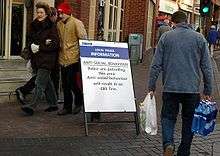Anti-social behaviour
Anti-social behaviours are actions that harm or lack consideration for the well-being of others.[1] Many people label behaviour which is deemed contrary to prevailing norms for social conduct as anti-social behaviour.[2]
The American Psychiatric Association, in its Diagnostic and Statistical Manual of Mental Disorders, diagnoses persistent anti-social behaviour as antisocial personality disorder.[3] The World Health Organization includes it in the International Classification of Diseases as "dissocial personality disorder".[4]
Development
Intent and discrimination may determine both pro- and anti-social behavior. Infants may act in seemingly anti-social ways and yet be generally accepted as too young to know the difference before the age of 4 or 5.[1] Berger states that parents should teach their children that "emotions need to be regulated, not depressed".[5]
Many of the studies regarding the media's influence on anti-social behaviour have been deemed inconclusive. The violence, racism, sexism, and other anti-social acts are attributed to things such as genetic predisposition and violence in the home. Some reviews have found strong correlations between aggression and the viewing of violent media[6] while others find little evidence to support their case.[7] The only unanimously accepted truth regarding anti-social behaviour is that parental guidance carries an undoubtedly strong influence; Providing children with brief negative evaluations of violent characters helps to reduce violent effects in the individual.[8]
In the UK

An anti-social behaviour order (ASBO) is a civil order made against a person who has been shown, on the balance of evidence, to have engaged in anti-social behaviour. The orders, introduced in the United Kingdom by Prime Minister Tony Blair in 1998,[9] were designed to criminalize minor incidents that would not have warranted prosecution before.[10]
The Crime and Disorder Act 1998 defines anti-social behaviour as acting in a manner that has "caused or was likely to cause harassment, alarm or distress to one or more persons not of the same household" as the perpetrator. There has been debate concerning the vagueness of this definition.[11]
In a survey conducted by University College London during May 2006, the UK was thought by respondents to be Europe's worst country for anti-social behaviour, with 76% believing Britain had a "big or moderate problem".[12]
Current legislation governing anti-social behaviour in the UK is the Anti-Social Behaviour, Crime and Policing Act 2014 which received Royal Assent in March 2014 and comes into enforcement in October 2014. This replaces tools such as the ASBO with 6 streamlined tools designed to make it easier to act on anti-social behaviour.[13]
See also
References
- 1 2 Berger, Kathleen Stassen (2003). The Developing Person Through Childhood and Adolescence, 6th edition (3rd publishing). Worth Publishers. ISBN 0-7167-5257-3.
- ↑ Welcome to Breckland Council. "Anti Social Behaviour". Breckland.gov.uk. Retrieved 2014-04-29.
- ↑ "Antisocial Personality Disorder". BehaveNet. Retrieved 2013-05-01.
- ↑ "International Statistical Classification of Diseases and Related Health Problems 10th Revision".
- ↑ Berger, Kathleen (2005). The Developing Person Through the Life Span. NY, New York: Catherine Woods.
- ↑ Anderson, Craig A.; Gentile, Douglas A.; Buckley, Katherine E. (15 December 2006). Violent Video Game Effects on Children and Adolescents : Theory, Research, and Public Policy: Theory, Research, and Public Policy. Oxford University Press. ISBN 978-0-19-534556-8. Retrieved 24 November 2014.
- ↑ Sherry, John L. (2007). Preiss, Raymond W.; Gayle, Barbara Mae; Burrell, Nancy; Allen, Mike; Bryant, Jennings, eds. Mass Media Effects Research: Advances Through Meta-analysis. Lawrence Erlbaum Associates. pp. 245–262. ISBN 978-0-8058-4998-1. Retrieved 24 November 2014.
- ↑ Nathanson, Amy I. (June 2004). "Factual and Evaluative Approaches to Modifying Children's Responses to Violent Television". Journal of Communication 54 (2): 321–336. doi:10.1111/j.1460-2466.2004.tb02631.x.
- ↑ "ASBOs can't beat a neighborhood policeman". Timesonline.co.uk. 30 September 2009. Retrieved 2014-04-29.
- ↑ "BBC Q&A Anti-social behaviour orders". BBC News. 2002-03-20. Retrieved 2014-04-29.
- ↑ Andrew Millie (2009). Anti-Social Behaviour. ISBN 0-335-22916-6.
- ↑ Matt Weaver and agencies (9 May 2006). "UK 'has worst behaviour problem in Europe". guardian.co.uk.
- ↑ "What the Law Says". ASB Help. Retrieved 26 September 2014.
External links
- Anti-Social Behaviour.org.uk
- MIT Technology Review - How a Troll-Spotting Algorithm Learned Its Anti-antisocial Trade
| ||||||||||||||||||
| ||||||||||||||